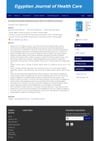TLDR The Ayurvedic program effectively manages hair loss due to iron deficiency anemia.
The study assessed the effectiveness of an Ayurvedic program in managing hair loss associated with iron deficiency anemia among 145 nursing students at Menoufia University, Egypt. Post-implementation, there was a significant improvement in the students' knowledge levels and key physiological markers, including hemoglobin, mean cellular volume, hematocrit, serum iron, and ferritin (p < 0.01). The findings suggest that the Ayurvedic program is effective in managing hair loss due to iron deficiency anemia, and public health awareness should be raised about this relationship and the benefits of the program.
 October 2022 in “Egyptian Journal of Health Care”
October 2022 in “Egyptian Journal of Health Care” Female nursing students with iron deficiency anemia have poor knowledge and practices regarding iron intake, needing better health education and physical monitoring.
12 citations
,
May 2021 in “Clinical Interventions in Aging” Men with androgenetic alopecia have oilier and less hydrated scalps, especially in sensitive areas.
64 citations
,
March 2021 in “Anaesthesia” Iron deficiency in women is common, often overlooked, and needs better recognition and treatment.
 February 2020 in “Scholars international journal of traditional and complementary medicine”
February 2020 in “Scholars international journal of traditional and complementary medicine” Ayurveda treats hair problems like hair loss and dandruff by balancing body elements and using natural remedies like Indian Gooseberry and false Daisy.
 November 2023 in “International Journal of Advanced Research in Science, Communication and Technology”
November 2023 in “International Journal of Advanced Research in Science, Communication and Technology” The herbal hair oil was more effective at reducing hair fall than coconut oil.
 April 2018 in “Journal of Ayurvedic and herbal medicine”
April 2018 in “Journal of Ayurvedic and herbal medicine” Computational methods can speed up and improve the development and safety of herbal drugs.
 2 citations
,
September 2023 in “Frontiers in sustainable food systems”
2 citations
,
September 2023 in “Frontiers in sustainable food systems” Traditional knowledge of edible oil-producing plants in Sinja Valley is declining due to outmigration and sociocultural changes.
 January 2025 in “The Pharma Innovation”
January 2025 in “The Pharma Innovation” Millets support sustainable development by improving nutrition, aiding climate resilience, and boosting economic viability, especially for Indian farmers.
 January 2024 in “Journal of Ayurveda and integrative medicine”
January 2024 in “Journal of Ayurveda and integrative medicine” Millets may help reduce chemotherapy side effects like nausea, fatigue, and hair loss.







